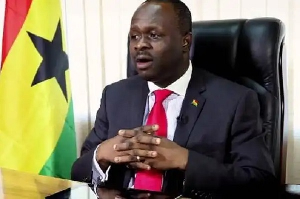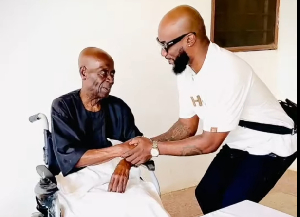We are just reaping what we sowed. The precedents have been set severally. The average Ghanaian is too pretentious.
Congrats, Mr Manasseh Azure, for confirming and not for exposing the systematically designed and well-executed plan that eventually diverted state funds into some greedy individuals’ pockets. The mouth-boggling and ‘googol’ amount in taxpayers’ money was deliberately looted from the state coffers on the pretext of SADA. Several events before Manasseh’s report had already informed people in power that the series of financial misappropriations in SADA were becoming unquantifiable. But what did we see? No action! And why? Because it is a norm, the unusual has now become the usual.
In his attempt to defend the indefensible; Alhassan M. Murtala, writing under the heading ‘The untold SADA story’ (@ ghanaweb 10/5/14), abused himself by attacking Manasseh in person and not his story. This writer needlessly devoted much of his time criticising the journalist of the year instead of explaining the achievements of SADA thus far as he sought to do. My simple question to him is ‘If SADA is on course as he claims, why did the President change the board? Bro Murtala, next time make good use of your energy.
Only common sense is required to justify that SADA has so far wasted our scarce resources. For example, to forest or reforest or reafforest a savannah ecological zone at this time when climate change has already caused delayed onset of rains and reduced the length of the rainy season, one has to select only highly adapted local tree species. And examples of such economically important and well-adapted species in the Guinea savannah are shea (Vitellaria paradoxa) and dawadawa tree (Parkia biglobosa). Currently, a bag of dawadawa seeds sells about GH ¢ 200.00, making it one of the most expensive and readily marketable cash crops.
MoFA and SADA are fully aware of the progress made by Dr JA Yidana at the Horticulture Dept of UDS in domesticating shea tree, which bears fruits 12–15 years after planting. Dr Yidana has already established several acreages of shea plantations in Tamale. The aforementioned bodies are also aware of the breakthrough made at the Biotechnology Centre of the Ghana Atomic Energy Commission (GAEC) in raising shea seedlings both from in vitro and ex vitro protocols. At GAEC, standard protocols for mass-producing shea seedlings have already been established and standardized. Despite being wild, shea tree sustains livelihood in the North more than any other crop. Interestingly, it was President JM, then vice, who inaugurated a GH ¢30 million ultra-modern Shea Butter factory at Buipe in the Northern Region.
From the above, if there is any tree planting project that will not only buffer the Guinea savannah against the encroaching desertification, but that will also sustain livelihood, common sense suggests that shea tree should be the number-one-priority species. Ironically, some of the tree planting projects especially the one in my village involved cutting down native trees and replacing them ill-adapted exotic ones.
In addition of to their slimmest chance of ever reforesting the Guinea savannah, 5 out of the 8 different tree species being planted by SADA namely: Tectona grandis, Senna siamea, Albizia lebbeck, Khaya senegalensis and Eucalyptus have a ZERO potential of sustaining the livelihood of the rural poor. The economic potentials of the remaining three are in limbo: cashew attracts the lowest price of all cash crops and I don’t need to tell you anymore about how mango farmers are currently struggling to sell their fruits.
Funny enough, some of the seedlings were transplanted as far as late August and September when the ‘technocrats’ at SADA are fully aware that the severe and long dry season begins knocking at our doors in October. Practically, the transplanted seedlings had less than two months to establish not only to withstand the long dry season but also to resist the annual bushfires. Yet 85 % of them survived. Hmm!
Untimely and ill-released, the UDS reported rather vindicated Manasseh. In addition, the report indicated how our researchers and other academicians have always allowed themselves to be misused and abused by politicians. Furthermore, it did show that book knowledge, the only requirement to earn a PhD or professorship in Ghana, is far from that needed to develop our country. My father, an illiterate in the true sense of the word, will never transplant seedlings into bush when the dry season is just about a month to be born.
The biggest concern to us (the Manasseh and the likes) is NEVER about the SADA board being changed; it is rather about measures being put in place to retrieve ALL the misappropriated funds. Demanding the ex-board to refund the money and even with interest is no punishment but rather an impetus for more crimes to occur elsewhere. From our recent political past, however, I foresee nothing like a refund. Again Why? We have set the precedents. Misappropriating state funds and going scot-free has been institutionalized. Committing crime of any kind and the case dying naturally is standardized in Ghana.
I will provide several examples here; the first one is the Suweiba’s missing baby issue. There’s no scale for measuring crime, but let’s attempt equating a whole human being declared missing in an international hospital to a fixed amount of money being diverted from the state coffers. Which of these crimes is so heinous that the public must keep standing until a solution is found? You’re the judge.
Throughout the missing-baby scandal, no single journalist tagged the baby theft with southerners. Specifically, the then CEO of KATH, Professor Ohene Adjei, is most likely an Asante or Akan in general. No media house reported that Akans are now stealing babies. Even how many newspaper headlines were devoted to the story and where has it travelled to?
Conversely, the mediascape in Ghana is happy to narrow the SADA scandal to only Northerners. Excessive politicization and to some extent ethnocentrism blinded most journalists from knowing that SADA operates in five regions (i.e., Volta, Brong-Ahafo and the three regions of northern Ghana). The worst aspect is that most of the journalists seem unaware that Ghana has only one Northern Region. The fact is ‘three regions exist in northern Ghana (‘northern’ here is a mere adjective showing a geographic direction; compare southern Ghana— the phrase ‘the three northern regions’ is a misnomer).
The sine qua non therefore is that, any society that selectively criticises some wrongs leaving others is bound to never see an end to crime. Thus, the SADA scandal made no news. We may likely not hear of any disciplinary measure being taken against the perpetrators.
Worse of all, the nation itself has no standard way of determining what is wrong or what is right and equally had no established ways of dealing with wrongdoers. In evidence, I use two governmental transactions: one during NPP time and one in this current NDC regime. When the Ghana Telecom was to be sold, the then main opposition NDC party vehemently opposed sale which was reportedly transacted by Mr Kufuor himself. Nonetheless, Parliament approved the sale.
We are all still battling with the NDC transaction. When the NDC govt decided to sell Merchant Bank, we heard what the now main opposition NPP and their affiliates civil society groups said. Fellow country men and women, which of these govts is telling the truth? Their actions are virtually converting Ghana into a TENANT STATE. Be the judge! Seeing nothing wrong with a wrong being executed by one group promotes wrongdoers elsewhere to commit more crimes. In consequence, the SADA story made no news.
Further evidence showing that the state lacks a procedure for universally agreeing on what is wrong comes from the behaviour of the occupants of the nation’s highest office. In addition to leaving behind the Greenstreet Report detailing how he should be treated like an Arabian King, ex-President Rawlings took away cars belonging to the Presidency. The then President Kufuor retrieved the cars from him. Congrats! However, to justify how morally bankrupt he himself is, ex-President Kufuor left behind the Chinery-Hesse report and also took away vehicles belonging to the Presidency including a bullet-proof car. President Mahama and his govt also retrieved them from him.
Fellow countrymen and women, are the above actions of our ex-presidents not criminal activities? If so, after retrieving the stolen cars, what else did we do to them? The SADA story made no news; we are just reaping what we sowed.
In case of Ebenezer Sekyi-Hughes, then Speaker of Parliament, it took only the timely intervention of the spirit of Kwame Nkrumah to stop him from uprooting the trees in the govt bungalow he occupied. Abaa! Only in Ghana. Yet some people including MPs argued for him; so must others notably Murtala argue for the former board of SADA.
Another recent event was the shooting and injuring of 9 persons in Tamale when NPP held its national delegates congress there. The then Chairman of the party, Mr Jake, criticized the police for not doing enough to protect them and also to arrest the shooters. Ridiculous! Is that the first time shooters couldn’t be identified in the Northern Region or in Ghana at large? The whole Ya-Na Yakubu Andani was beheaded during NPP’s regime and to-date, no one has been identified as the killer of the late chief. Thus, a society that selectively exaggerates some wrongs leaving others shall continue celebrating wrongs. The SADA scandal made no news; we are just gimmicking unnecessarily.
Good news! Every long journey has an end. The writer is not attempting to justify wrong with wrong. If as a nation, we decide that enough is enough and that we will collectively start dealing ruthlessly with crime and that we will start from this SADA scandal, let’s do us. But in our quest of doing so, let’s avoid tagging the scandal with Northerners and deal with the perpetrators as citizens of Ghana who wronged us all. After all, the funds for SADA came from the central govt and shall continue to come from the govt.
Fellow countrymen and women, ignore the political parties and the media. The media houses, both print and electronic, are established by political parties and their aim is to broadcast only information that favours the said parties.
Long live the Manassehs! Long live Kwame Nkrumah’s Ghana.
Idris Pacas: +233 20 910 1533
Opinions of Wednesday, 14 May 2014
Columnist: Pacas, Idris


















